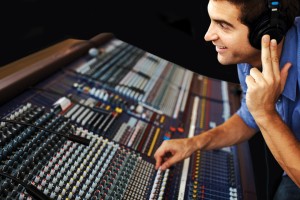Every time one hears a good song, whether it is live or studio-recorded, one generally tends to glorify the musician. A majority of people are able to distinguish good music from bad, but few are trained to figure out how good the quality of the sound is. Are the guitars overpowering the vocals when they aren’t supposed to? Or perhaps the same song on a CD sounds better than it does on a cassette. These seemingly minute factors that help bring out the best quality sound are of paramount importance and are brought about by the indispensable audio engineer.
What does an audio engineer do?
An audio engineer is the person responsible for tweaking the sound of music albums, jingles, radio spots, films and documentaries so that the final product sounds polished and enhanced. He or she undertakes a wide variety of audio-related jobs that include high-quality music recording, dubbing and sound design amongst others. An audio engineer uses equipment to record, synchronise, mix and reproduce music, voices and sound effects. In a large studio, there could be as many as three different types of engineers – the main recording engineer, the recording assistant and a mix engineer. While the main recording engineer undertakes the actual job of recording high-quality, live music in such a way that it matches up to how the musicians wish the track to sound, the recording assistant helps with the pre-session setup of microphones and equipment as well as anything that needs to be setup during a recording session. The mix engineer is responsible for mixing the tracks after they are recorded.
Career options
An audio engineer can either work in a studio environment or can choose to specialise in live sound for concerts and events. With regards to the former, you could be working in different studios everyday in tandem with musicians and voice-over artists, but if you choose to be a live sound engineer, you will be working at a different live venue for each job. You can specialise in any of these profiles – dubbing room engineer, mixing engineer, audio operator, broadcast technician, mastering engineer, acoustic consultant, sound editor, control operator or foley engineer (one who creates sound effects).
Requirements
Sound engineering courses offer an indepth understanding of what it takes to become a successful audio engineer. Courses include formal lectures, practical workshops, assignments and audio projects. Guest lecturers are invited to give students an insight into this field. Courses also offer you individual studio time that is vital to grasp the skills and techniques that are employed in recording studios. You’ll also get access to cutting-edge equipment and software. You must have an ear for different types of sounds and a balanced sense of timing, pitch and rhythm. Working as a studio apprentice will teach you a lot about different engineering methods. According to musician and producer Aldrin Rodrigues, who has worked in the sound industry for over 15 years and owns Rhapsody, a sound production company, “It’s important to get a formal education in sound so that one gets a head start in the field. On joining a studio, one can learn the technicalities involved in recording and engineering. Having said that, even after doing a course, one has to do his time and gather the maximum experience possible before he starts looking for opportunities as an independent engineer.”
Institutes and workshops
The internationally-renowned SAE Institute has centres in Indian metros like Mumbai, Chennai, Bangalore and Delhi. You can opt for the Diploma in Recording Arts at the institute. The Audiophile Institute of Sound Engineering in Cochin offers a one-year diploma in sound engineering (Rs. 1,75,000) for which one must complete class 12 with a science major. The Satyajit Ray Film and Television Institute, Kolkata offers a three-year fulltime postgraduate diploma course. Graduates with a specialisation in physics are eligible for this course. Mumbai’s Digital Academy offers a Sound Recording and Engineering course for Rs. 2,49,999.
Demanding job
The working hours of an engineer are unpredictable. You might find yourself working for long and irregular hours in a confined studio environment or at a live show. You might also sit through late nights, weekends and public holidays to finish projects. After all, it depends on when the artists and producers are available. A good amount of dedication is required too. Since a single day could comprise working on varied projects at a single time, the ability to multitask should also be your strong point.
Lucrative or not?
The boom in the television, radio and advertising industry has resulted in an increased demand for audio engineers. Opportunities are abundant in India’s mushrooming studios as in-house engineers. The salary of an in-house audio engineer ranges from Rs. 12,000 to Rs. 70,000 as per the level of skill and experience. If an engineer is not affiliated to any studio and works as a freelancer, one can charge on the basis of a shift or on a per project basis,” explains Rodrigues. If the technicalities of sound fascinate you, it’s time you embark on a sound career!
A Day in the Life of an Audio Engineer
- Setting up and testing recording equipment
- Conferring with producers and musicians to achieve the desired sound
- Regulating volume levels and sound quality during sessions
- Mixing and editing voices, music and sound effects
- Synchronising and equalising pre-recorded dialogues, music































